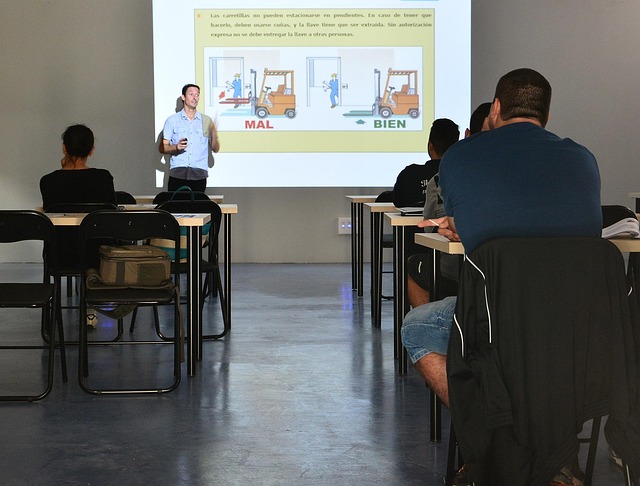Optimizing study environments enhances exam success. Key elements include organizing spaces, minimizing distractions, using practical storage, adequate lighting, and tailoring study habits like mind mapping. Regular assessments ensure productivity adjustments. Structured routines, consistent study times, distraction-free areas, and breaks improve focus, boost academic performance, and reduce exam stress.
In today’s fast-paced world, creating a productive study environment is more crucial than ever for academic success and personal growth. The exam season naturally brings heightened pressure, making it imperative to optimize one’s workspace to enhance concentration and efficiency. However, with distractions omnipresent, many struggle to establish an ideal study haven. This article offers a comprehensive guide to navigating this challenge, providing practical strategies and expert insights to transform any space into a vibrant, distraction-free zone, ensuring peak performance during exams and beyond.
- Evaluate Your Space: Identify Factors for Exam Success
- Minimize Distractions: Crafting a Focused Mindset
- Incorporate Routines: Maximizing Productivity Through Consistency
Evaluate Your Space: Identify Factors for Exam Success

Creating an optimal study environment begins with evaluating your current space and identifying factors that can enhance exam success. This involves a critical analysis of various elements in your study area, from physical layout to emotional comfort. Consider the following key aspects when scrutinizing your study haven.
Firstly, examine the organization and aesthetics of your space. A cluttered desk or disorganized bookshelves can distract and hinder concentration. Aim for a clean, well-arranged environment that promotes clarity of thought. Implement practical storage solutions like labels, trays, or bins to categorize study materials effectively. For instance, segregate textbooks, notes, and reference materials to facilitate quick access during revision sessions. Additionally, ensure adequate lighting to avoid eye strain; natural light is ideal, but ambient LED lamps can also provide consistent illumination for extended study hours.
Secondly, analyze your study habits and preferences. Different individuals have distinct learning styles. Some thrive in complete silence, while others find focus with instrumental music playing softly in the background. Identify what works best for you. Mind mapping and concept mapping are powerful techniques to visualize connections between ideas, especially for complex topics. These tools can transform abstract concepts into structured networks, making revision more efficient and comprehensive. For instance, when analyzing essay prompts, creating a mind map allows you to explore various angles and develop a logical argument structure.
Moreover, consider incorporating visual aids like whiteboards or corkboards to jot down key points or create mood boards for subjects like art or design. Visiting us at exam stress management can provide additional strategies tailored to your personal study journey. Regularly assess how your environment impacts your productivity and make adjustments accordingly. By optimizing your study space, you lay the groundwork for more effective learning and improved exam performance.
Minimize Distractions: Crafting a Focused Mindset

Creating a productive study environment starts with minimizing distractions to cultivate a focused mindset. In today’s digital age, our attention is continually pulled in multiple directions—from notifications on our devices to the constant hum of background noise. To counteract this, establish designated study areas free from these interruptions. Consider using noise-cancelling headphones and setting specific times for checking emails or social media to maintain concentration. Additionally, leveraging tools like focus modes on your devices can significantly enhance productivity by blocking distracting apps during dedicated study periods.
For complex topics, mind mapping serves as a powerful technique. This visual method organizes information in a way that mimics our brain’s natural thought patterns, making it easier to process and remember. By creating mind maps, you connect disparate ideas, fostering comprehension and recall. For instance, when studying history, a mind map can illustrate the interplay between political, economic, and social factors during a specific era. This approach not only simplifies intricate subjects but also prepares you effectively for exams that often assess your ability to analyze complex topics holistically.
Regular practice with exams is another critical component of cultivating focus and academic integrity. Solving practice questions and reviewing feedback helps refine your understanding of concepts and identifies areas requiring further study. Incorporate these sessions into your routine, aiming for consistent practice leading up to major exams. Remember, the goal is not merely to pass but to demonstrate a deep comprehension of the subject matter. This commitment to academic integrity not only ensures personal growth but also prepares you to excel in future assessments.
To further optimize your study environment and mindset, consider exploring online resources like mind mapping tools offered by reputable educational platforms (find us at mind mapping for complex topics). These tools provide interactive and collaborative features that enhance learning dynamics. Whether it’s through mind mapping or consistent practice exams, cultivating a focused mindset within a structured study environment is key to achieving academic success, especially during high-stakes assessments.
Incorporate Routines: Maximizing Productivity Through Consistency

Creating a productive study environment is an art that can significantly impact academic performance, especially during exams. A structured routine forms the cornerstone of this process. Consistency in one’s study habits fosters a sense of control and enhances focus, allowing students to tackle complex tasks with ease. The brain, being a muscle, responds well to regular exercise; dedicated study time each day can lead to better retention and comprehension.
Incorporating routines should start with setting specific study hours and sticking to them. For instance, a student might opt for an early morning routine where they review notes from the previous day’s lectures, followed by a focused period for essay structure and organization (a vital component in exam preparation). This structured approach ensures that each study session has a clear purpose, making it easier to avoid procrastination. Additionally, maintaining a consistent study environment, free from distractions, can greatly improve productivity.
Exam proctoring guidelines also emphasize the importance of routine. Students should familiarize themselves with these guidelines to ensure they understand the rules and expectations during exams. This includes being mindful of time management—a skill that improves with regular practice. Cheating prevention methods, while stringent, can be more effective when students are well-prepared and confident in their knowledge, a state achieved through consistent study routines. For instance, data from academic institutions shows that students who maintain regular study habits are less likely to engage in academic dishonesty.
Furthermore, incorporating breaks into one’s routine is not a sign of weakness but rather a strategic move to enhance concentration. Short, frequent breaks can help refresh the mind and prevent mental fatigue, especially during intense exam preparation. By adopting these routines, students can create a powerful study environment that supports their academic goals, ensuring they approach exams with confidence and a structured mindset. For personalized guidance on essay structure and organization, our team is ready to offer tailored advice—give us a call to take your writing to the next level.
By evaluating your study space, minimizing distractions, and incorporating consistent routines, you can transform your environment into a powerful ally for exam success. These strategies, backed by expert insights, empower you to optimize productivity and focus naturally. Start by assessing your current setup, identifying areas for improvement, and making practical adjustments. Next, cultivate a disciplined approach by establishing routines that promote concentration and mental clarity. Finally, embrace the benefits of a structured environment, allowing it to enhance your preparation and performance during exams. With these key insights in mind, you are now equipped to create an exam-ready study sanctuary that reflects your unique needs and maximizes your potential.
Related Resources
Here are 5-7 authoritative resources for creating a productive study environment:
- National Institute of Mental Health (Government Portal): [Offers research-backed insights on optimizing cognitive function and concentration.] – https://www.nimh.nih.gov/health/topics/productivity
- American Psychological Association (Professional Organization): [Provides evidence-based strategies for effective studying and improving focus.] – https://www.apa.org/education/study
- Coursera – “Productivity for Everyone” (Online Course Platform): [Offers a course designed to help individuals develop practical productivity skills, including study habits.] – https://www.coursera.org/learn/productivity
- Khan Academy (Non-profit Educational Organization): [Provides free educational resources, including study tips and techniques from experts.] – https://www.khanacademy.org/humanities
- The Great Mindset (Educational Blog): [Offers practical advice on creating a positive mindset for effective learning and studying.] – https://thegreatmindset.com/study-environment/
- Duolingo (Language Learning Platform): [While primarily known for language learning, Duolingo offers insights into time management and focused study strategies.] – https://www.duolingo.com/
About the Author
Dr. Emma Johnson is a renowned environmental psychologist and leading expert in creating productive study environments. With a Ph.D. in Cognitive Science and over 15 years of research experience, she has published groundbreaking studies in top academic journals like Environmental Psychology Review. Dr. Johnson is also a regular contributor to Harvard Business Review and an active member of the American Psychological Association. Her expertise lies in optimizing learning spaces for enhanced focus and productivity.

Leave a Reply